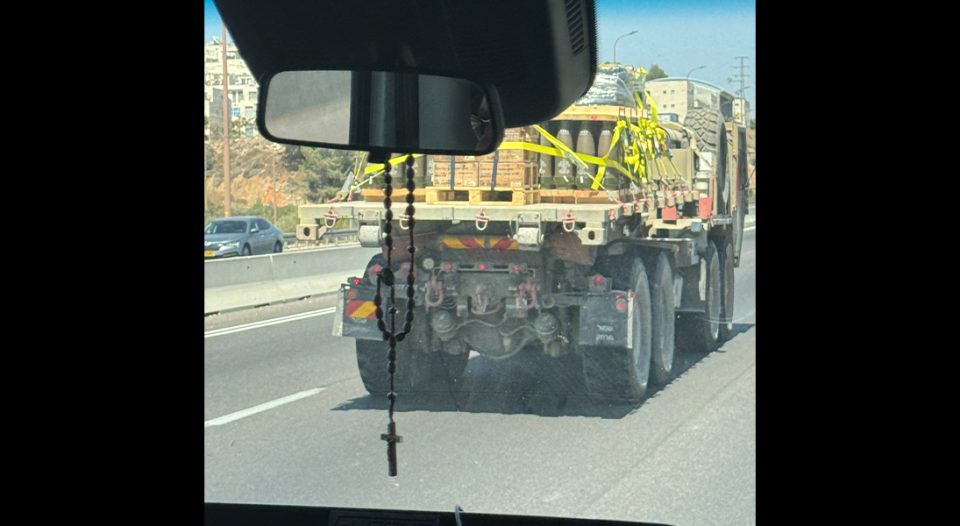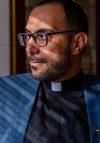Editor’s note: On Sept. 6, Khader Khalilia, program director for ELCA Arab and Middle Eastern Ministries, addressed the church’s Multicultural Young Adult Event in New Orleans. Presented by the ELCA Ministries of Diverse Cultures and Communities (MDCC) team, the gathering was held to build community and communicate to the churchwide organization the needs of the affiliated Indigenous, racial and ethnic ministries. MDCC is sharing Khalilia’s remarks in hope of highlighting ministry concerns and engaging the wider ELCA in what continues to be a critical conversation.
I am a Palestinian Christian. My family has followed Christ for generations. Our roots are deep in the land and culture of the Bible, Palestine.
That is where I was born and raised and where my identity as a Christian and a Palestinian was formed. But my childhood, like those of millions of Palestinians, was [defined not only] by my family and church but also by Israeli occupation and ethnic cleansing.
I lived under Israeli occupation throughout all my childhood. My family tried to lead a “normal” life, as many Palestinians do—going to school, celebrating holidays, attending church, studying, working. But under occupation, even the most basic routines often become acts of resistance.
You never know what will happen. At any moment, a curfew can be declared. A road can be blocked. Your electricity or water can be cut. Your cousin can be arrested without charge. Your neighbor’s house can be bulldozed.
This kind of uncertainty is itself a form of violence.
This kind of uncertainty is itself a form of violence. You cannot plan your future. You cannot dream freely. Every part of your life exists under the shadow of someone else’s control.
When I was a teenager, the second intifada erupted. One day, Israeli soldiers stormed our home and turned it into a base. They confined my entire family to a single room while they used our house as a strategic position. We eventually had to abandon it and live with my grandmother for three months.
Another time, we spent over six hours lying on the floor, bullets flying outside, praying they wouldn’t come through the windows. I kept moving my little brother from corner to corner, trying to shield him with my body.
These are not unusual stories. These are the daily lives of Palestinians.
And while the world tells us to be patient, to wait for negotiations, to trust the so-called peace process, our reality remains unchanged.
Peace cannot grow where there is no justice. And justice cannot come from the silence of those with power.
The world watches
The past two years have been among the most horrific in living memory for Palestinians—especially in Gaza.
But let’s be clear: this did not begin on Oct. 7, 2023. That date has become a convenient starting point for media narratives, but it is not the beginning of the story. It is the continuation of 77 years of displacement, dispossession and dehumanization.
In Gaza, more than 70,000 people have been killed since Oct. 7. Among them, over 17,000 children. Let me say that again: over 17,000 children.
And still, the killing continues. With American-made bombs. With full U.S. diplomatic cover. With the silence or inaction of the majority of Western churches.
Gaza today is not a war zone—it is an annihilation zone.
A place where families are bombed in their sleep. Where babies are born and die within days because there is no incubator, no electricity, no clean water. Where entire apartment blocks are wiped out with a single airstrike.
Even hospitals have become targets. Schools have become graves. U.N. shelters have become death traps.
This is not a war.
Gaza has no army. No air force. No navy. Gaza is the site of an ongoing genocide, home to over 2 million people, half of them children, all of them besieged by land, sea and air. Every day and every night for two full years.
The church has largely gone quiet.
The world watches. And the world—especially the powerful parts of it—does nothing. Worse than nothing: It funds it. It arms it. It excuses it. It enables it.
And the church? The church has largely gone quiet. We hear a few timid prayers. We see a few calls for peace. But peace without justice is just a cover for injustice. Silence is not neutral; silence is complicity.
And let me be even more specific: Silence about the genocide in Gaza is a betrayal of the gospel. Let me name something hard: the Western church has been in denial about what is happening in Palestine.
We like to speak of human rights in general terms. We like to quote prophets like Amos and Isaiah when it’s convenient. We like to say “justice” from the safety of our pews.
But when it comes to Palestine? We hesitate. We soften.
Why? Because too many churches have been discipled not by Jesus but by empire. They’ve inherited a theology shaped more by Western exceptionalism and white supremacy than by the Sermon on the Mount.
Many of the same churches that spoke boldly during apartheid in South Africa now shrink in the face of Israeli apartheid and ethnic cleansing. Many of the same voices that marched for civil rights are now mute when Palestinian homes are bombed.
And yet the facts are clear. As Mitri Raheb, president of Dar al-Kalima University in Bethlehem, said in his book Decolonizing Palestine: The Land, the People, the Bible (Orbis Books, 2023), “We are the people of the land—the living stones of the holy places—and yet we are disappearing because the world has baptized our displacement.”
Compassion, courage and truth
Friends, Palestine is the land of Christ. And the church is complicit in its crucifixion.
Now we must confront a theology that lies at the root of much of this silence: Christian Zionism. Let me be clear: Christian Zionism is not Christianity. It is a heresy.
It replaces the cross with a tank and F-16. It replaces the Beatitudes with bulldozers. It turns God into a real estate broker and Jesus into a colonizer.
It says, “Bless Israel at all costs,” and in doing so, it abandons every Palestinian Christian, every Palestinian child and every truth of the gospel.
Christian Zionists claim that to criticize the state of Israel is to go against God. But we know that God does not endorse occupation. God does not bless genocide. They quote Genesis—“I will bless those who bless you”—but forget that the New Testament redefines the people of God not by ethnicity or borders but by faith and justice.
The gospel of Jesus is not about domination. It is about the kingdom of God breaking through in compassion, in courage, in truth.
This is a moment of reckoning.
Christian Zionism is a political ideology wrapped in spiritual language. And it must be rejected—not only for its theological error but for its role in enabling violence, genocide and ethnic cleansing.
This is a moment of reckoning. Not just for politicians. Not just for nations. But for the church, who claim the name of Jesus.
This genocide is not just a political failure—it is a spiritual one. A theological one. A moral one. And we must repent.
We must repent for every sermon that mentioned “justice” in abstraction but said nothing of Gaza. We must repent for every mission trip that came to the Holy Land to see ancient stones but not living Palestinians. We must repent for every prayer that cried for peace in Ukraine but ignored the bombs falling on Rafah and Gaza City.
We must repent for reading the Bible as if it belonged only to the powerful, the Western. We must repent for forgetting that Jesus was not a Roman. He was not a European. He was not American. He was a brown-skinned, colonized Palestinian.
He was born under empire. He lived under occupation. He died by state execution. And if he were born today, he would be in Gaza, under siege and under the rubble.






